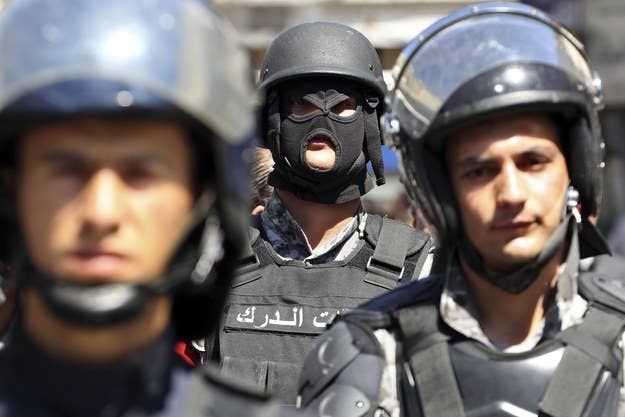
AMMAN, Jordan – Concerns over the militant group ISIS dominated a meeting last month between U.S. and Jordanian military officers convened to discuss security threats to the region.
"They all want to know what we are going to do to make sure that Jordan isn't the next Syria or Iraq," said one U.S. officer named Matthew, who spoke on condition that he only be identified by his first name. "But other than keep doing what we're doing, we don't really have much to say."
"It's hard to look them in the eye and pretend we have answers," Matthew said.
ISIS' dramatic takeover of the major Iraqi city of Mosul this week put concerns over the group's increasing strength into the spotlight. But regional neighbors have long been fearing just such a nightmare scenario.
The group of U.S. and Jordanian officers met in a small hotel in downtown Amman on the sidelines of annual joint military exercises known as "Eager Lion." The exercises are designed to inspire confidence in Jordan, one of the closest U.S. allies in the region, but this year they ended with little fanfare.
The U.S. officers tried to keep the conversation focused on new U.S. equipment that had been brought in to Jordan, boasting about night-vision equipment, while the Jordanians kept turning the conversation back ISIS.
"They keep wanting to talk about toys and we want to talk about real threats," Hamid Hamzawy, a Jordanian tank commander, said as he left the meeting. "The Americans have no idea what to do, and they don't want to come up with a plan. They are telling us to wait and be patient, but we all know where that will get us."
Jordanian officials have looked on with growing consternation as the strength of militant Islamic movements in the region has grown, unabated. The steady rise of ISIS threatens the entire region, and few countries are as susceptible as Jordan, with its long northern border to Iraq and Syria.
"We need the U.S. to throw their full backing behind us," said Khaled Kaladeh, minister of parliamentary affairs. "Unless the U.S. does everything it can, gives everything it can, we will find ourselves in more than a fragile position, we could find ourselves breaking."
A video released by ISIS earlier this year directly threatened the Jordanian king, who many militant groups see as a secular ally of the West.
Some in the video appear to be Jordanian nationals, who tear their passports as they vow to launch suicide attacks inside Jordan.
"It would not take much for Jordan to collapse," said one Jordanian political official, who asked to remain anonymous, as he was not permitted to speak to foreign media. "We are held together, very loosely, but the decades of refugees, Palestinian, Iraq, and now Syrian, leaves many opportunities for groups who want to seize on sectarian strife."
In a speech last month, President Barack Obama said he would weigh sending a limited number of U.S. troops to Jordan and offer "counterterrorism aid" to the Jordanian government, part of a billion-dollar effort the White House is eager to push.
In Jordan, the offer was met with little excitement.
"The only difference would be that now the U.S. training in Jordan would be public. For us, this is no real difference. For our enemies who see us as allies of the U.S. and beneficiaries of the U.S. it is already well-known that there are American soldiers here at all times," said the Jordanian political official. "It might make us slightly more vulnerable to extremists who want to target the U.S. but this is not a big game changer. As far as we are concerned, we are already vulnerable."
The presence of thousands of U.S. troops in Jordan for the Eager Lion exercise was like a "band-aid on a severed leg," he added.
"Every year thousands of soldiers form all over the world come for these exercises and it is a big show, but what happens when they leave? Well I will tell you that each year the threats by terrorists, by hardliners who want to destabilize Jordan, each year those threats are bigger," he said.

